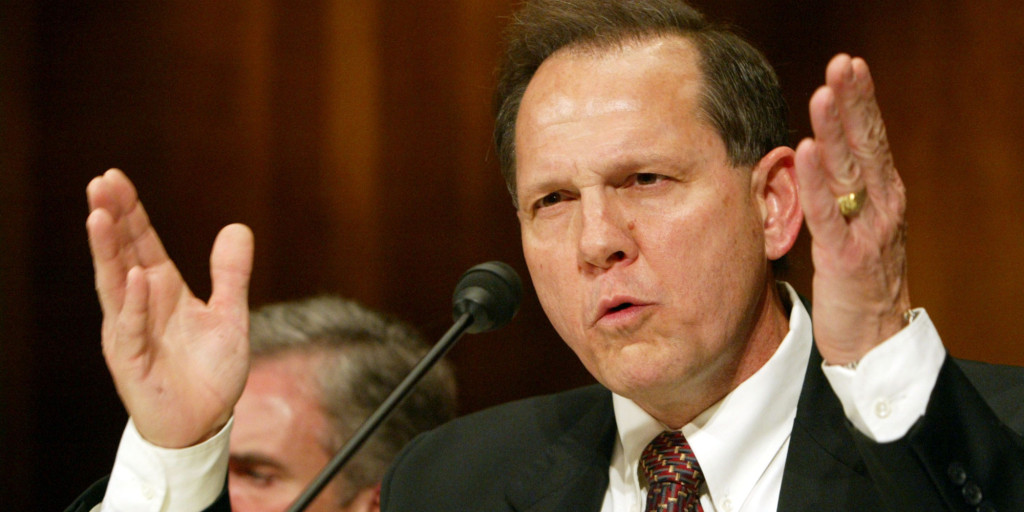Suspended Chief Justice Roy Moore defends his gay marriage ban memo

Suspended Alabama Supreme Court Chief Justice Roy Moore is defending his January 2016 memo to probate judges regarding same-sex marriage. Moore submitted an affidavit Tuesday explaining he was not defying the high court’s decision, but seeking to resolve any “confusion” among probate judges because of what he says were lingering questions about the impact of the federal decision. On March 3, 2015, the Alabama Supreme Court ordered probate judges to stop issuing marriage licenses to same-sex couples. Then on June 26, 2015, U.S. Supreme Court legalized gay marriage. “I believe it is time for us to make a decision in this case, one way or the other: to acquiesce in Obergefell and retreat from our March orders or to reject Obergefell and maintain our orders in place,” Moore wrote his fellow justices in September 2015, explaining it would be “very unfair” to leave “probate judges of this state to bear the stress of this battle alone with no guidance from us.” Months later, in January 2016, Moore readdressed the issue, noting the Alabama Supreme Court had not lifted its March 3 ruling prohibiting probate judges from issuing licenses to gay couples. He said it’s up to the state court to decide what to do with that order following the U.S. Supreme Court’s decision. Following his order, an ethics complaint was filed against him and he was immediately suspended from office pending investigation. Moore could be permanently removed from his post, if the state’s Court of Judiciary concludes he violated judicial ethics by urging probate judges to defy the U.S. Supreme Court ruling. Earlier this month, the state’s Judicial Inquiry Committee (JIC) requested the Court of Judiciary to immediately remove Moore for abusing his office and has since accused Moore of playing “semantic gamesmanship” in attempting to justify the January memo. The Court of the Judiciary will hear arguments Aug. 8.
Ethics panel wants Alabama Chief Justice Roy Moore removed from office

Alabama Chief Justice Roy Moore should be immediately removed from office for a second time, a state ethics commission argued Friday. The Judicial Inquiry Committee (JIC), an appointed body that oversees the state’s judges, asked the Court of Judiciary to immediately remove Moore for abusing his office by urging the state’s probate judges to defy the federal courts on gay marriage despite the U.S. Supreme Court’s decision affirming same-sex marriage six months prior in Obergefell v. Hodges. Last month, Moore and his legal team filed a motion to request all charges against him be dismissed. Moore argued he was not telling probate judges what to do, but rather responding to questions regarding the status of a case. The JIC dubbed his explanation “semantic gamesmanship.” “Moreover, because he has proven — and promised — that given the opportunity he would ignore our nation’s founding principals and flout the rule of law again, the only sanction that will adequately protect the Alabama judicial system, and the citizens who depend on it for justice, is an order from [the Court of the Judiciary] removing Roy S. Moore from the office of Chief Justice of Alabama,” the JIC said in their Friday afternoon response. The Obergefell decision effectively legalized same-sex marriage across the United States, thus solidifying the unconstitutionality of Alabama’s same-sex marriage ban. “Reduced to its essentials, the Complaint contains six charges alleging that the Chief Justice’s January 6th Order not only constituted flagrant disregard of federal law by directing every subordinate probate judge in Alabama to ignore a federal injunction and clear federal law,” the JIC said. “But also represented an abuse of his administrative authority, and placed his impartiality into question on a matter pending before the Alabama Supreme Court — all of which violate the Alabama Canons of Judicial Ethics.” In June, the Court of the Judiciary agreed to hear oral arguments from Moore regarding his motion for dismissal. The hearing was set for Aug. 8 by Chief Judge Mike Joiner.


